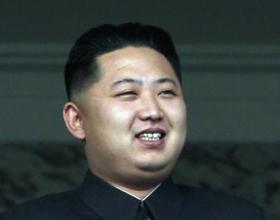Sunday, November 3, 2013
Loading
The BlogNext of Kim: The Great Leader 3.09:45 AM, Dec 28, 2011
• By REUBEN F. JOHNSON
Kiev  Kim Jong Eun With the death of Kim Jong Il, as when his father Kim Il Sung died in 1994, the Kim Family Regime, or KFR as it is referred to by U.S. military planners, is doing its best to show an orderly and stable transition of power from one Kim to the next—the 27- (or 28) year-old Kim Jong Eun, the son that Kim Jong Il previously designated as his successor. The ascension of the younger Kim to his father’s (and grandfather’s) exalted position as the “Great Leader” cements the KFR’s status as a Communist monarchy (a category of governance that is anathema to the Marxist-Leninist principles that are supposedly the North Korea’s state ideology). But there are signs that this transition is not as stable as the one when Kim Jong Il took the reins of state authority from Kim Il Sung in 1994. The “most telling indicator,” according to a colleague based in Beijing, “is that it took more than 48 hours for the DPRK to announce the death of Kim Jong Il. The regime can try to deflect questions by claiming that there is a Confucian tradition of a 30-hour period of mourning before a death is to be announced, but the prolonged span of time suggests a less than orderly transfer of power.” Despite this sign of uncertainty, the KFR is following the well-known script for the death of a despotic Communist dictator. The obligatory announcement of a funeral committee of no less than 232 persons recalls the macabre protocol established in the darkest days of Soviet Union’s Stalinist terror that Kim Il Sung tutored under. As the designated successor, Kim Jong Eun is number one on the committee and the others are then listed in the order of their importance. Immediately after Great Leader 3.0 are the members of the “standing committee” of the ruling Communist party’s Politburo, then the other full-status members and candidate members. Analysts based in South Korea believe the ordering of names suggests that the younger Kim is placing the center of gravity with the Korean Worker’s Party and elevating it above that of the DPRK military establishment. The late Kim Jong Il’s brother in-law, Jang Son -Taek, and O Kuk Ryol, the vice chairman of the National Defense Commission, are further down the list than one might have expected—considering that the former was more or less acting as the ruling regent while the older Kim’s health was fading and the younger Kim was still in “training” to take over. This presents the first of several potential unhappy scenarios. North Korea hanging together and not turning into a lawless, famine-stricken wasteland with refugees streaming across the border into China depends on ruthless, one-man rule backed by an unforgiving police apparatus. But there is more than one analyst predicting that Jang Song Taek is not likely to turn over absolute power to the young Kim. Instead he could try and carve a niche for himself in the power structure and turn the once-unified ruling order into a group of squabbling factions. China is up there with South Korea on the list of those who could be most adversely affected by North Korean disintegration, but the officialdom in Beijing continues to embody the triumph of hope over experience. The official Foreign Ministry statement “boils down to saying that ‘we loved Kim Jong Il and we are prepared to love Kim Jong Eun,’” according to one Beijing analyst, but it is clear that Beijing wants the younger Kim to know that continuing to love him will be contingent upon changes in the regime’s policies. Zhu Feng, the deputy director of the prestigious Strategic Research Centre at Peking University and one of the academics that the Communist state in Beijing permits to talk openly with the press, told Australian news outlets that China had “sent clear and definitive signals” in recognizing Kim Jong Eun as the next leader, but that they expected him to stabilize the nation. “China wants stability in North Korea's power transition, as well as its domestic situation. Instability is not in the interests of China,” he said. “China really wants North Korea to understand that reform and opening up are crucial to its survival.” Recent Blog PostsThe Weekly Standard ArchivesBrowse 15 Years of the Weekly Standard 
|